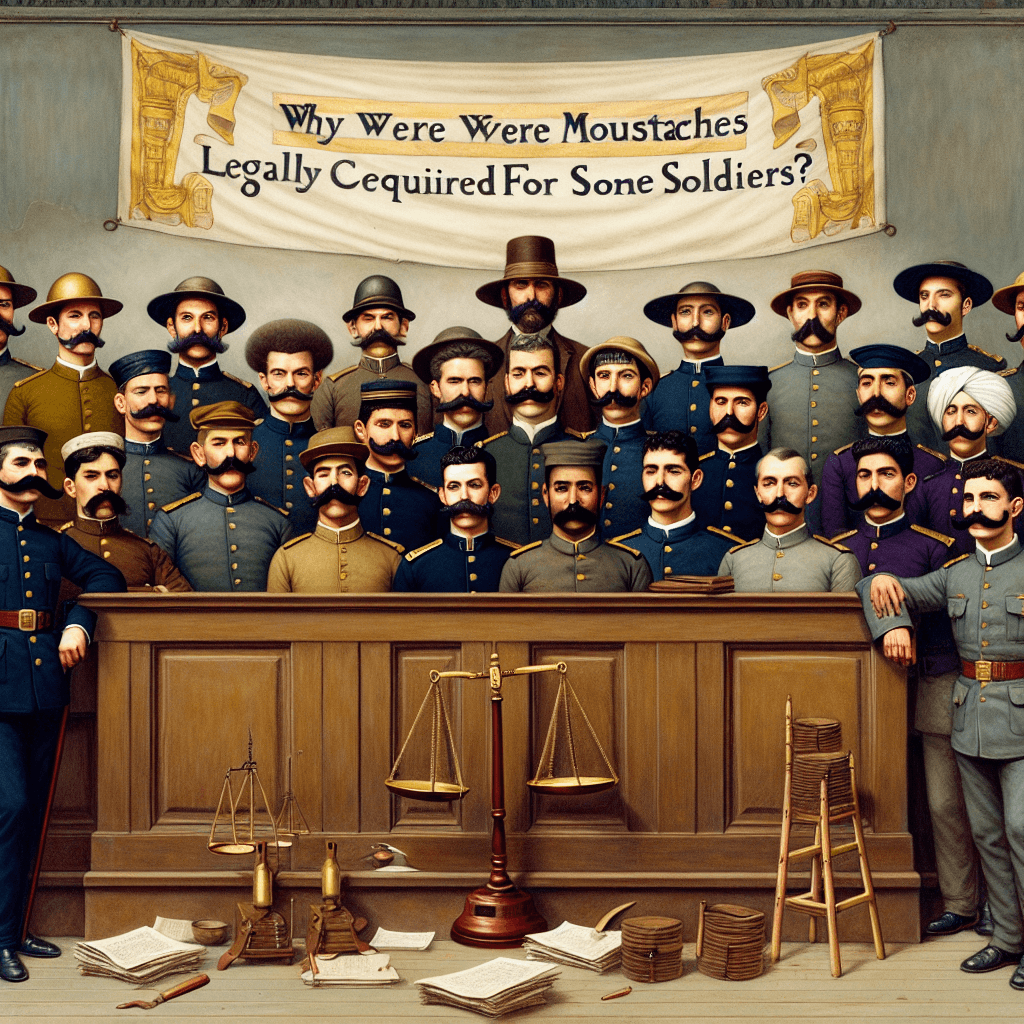Why were moustaches legally required for some soldiers
It wasn't a fashion statement, it was military law; discover the surprising history of armies where a clean-shaven upper lip was a punishable offense.


Too Long; Didn't Read
TLDR: From the mid-1800s to 1916, armies like the British legally required moustaches as part of the uniform to promote an image of manliness, authority, and experience, and to intimidate enemies.
The Moustache Mandate: Why Were Moustaches Legally Required for Some Soldiers?
Can you imagine being ordered by a commanding officer not just to fight, but to grow a moustache? For over half a century, that was the reality for soldiers in the British Army. In an era where modern militaries often enforce strict, clean-shaven policies, the idea of mandatory facial hair seems almost bizarre. Yet, from the mid-19th century until the height of World War I, the moustache was not a matter of personal style but a compulsory part of the uniform for British troops. This blog post will explore the fascinating reasons why moustaches were legally required for some soldiers, delving into the cultural symbolism and military context behind this unique regulation.
The Rise of the Regimental Moustache
The most famous and long-lasting facial hair directive was the British Army's King's Regulations No. 1695. While variations existed earlier, this rule was formally enforced from around 1860 to 1916. It stated, "The hair of the head will be kept short. The chin and the under lip will be shaved. Whiskers, if worn, will be of moderate length. Moustaches will be worn." The only exception was for new recruits who were given time to grow one.
This wasn't a suggestion; it was an order. Soldiers of all ranks, from the lowest private to the highest-ranking general, were required to sport hair on their upper lip. Failure to do so could result in disciplinary action, including being confined to barracks or facing extra duties. Beards were generally forbidden, making the moustache the sole, non-negotiable piece of facial hair for a British soldier. But what was the reasoning behind such a specific and seemingly cosmetic rule?
More Than Hair: The Symbolism Behind the Mandate
The mandatory moustache was not an arbitrary fashion choice. It was deeply rooted in the Victorian era's cultural values and military philosophy. The primary reasons behind the regulation can be broken down into a few key areas:
- A Symbol of Masculinity and Ferocity: In Victorian society, the moustache was a powerful symbol of manliness, strength, and virility. For the military, it served as a visual tool to make soldiers appear more intimidating and ferocious to their enemies. A clean-shaven face was often associated with youth and inexperience, while a full, well-kept moustache projected an image of a seasoned, formidable warrior.
- Emulating Powerful Forces: Military traditions are often influenced by other armies. During the Crimean War (1853-1856), British soldiers fought alongside their mustachioed Ottoman allies and against their equally mustachioed Russian foes. The impressive facial hair of these cavalrymen and infantrymen was seen as a mark of a true soldier. This, combined with the harsh campaign conditions that made daily shaving difficult, helped popularize the look, which was soon codified into official regulation.
- Projecting Authority and Experience: The moustache was also a sign of maturity and authority. It helped distinguish professional soldiers from the civilian population and reinforced the military hierarchy. It created a uniform, imposing look across the ranks that was believed to foster discipline and a strong martial identity.
The Great War and the Great Shave
The reign of the mandatory moustache came to an abrupt end in the mud-soaked trenches of World War I. The very nature of warfare had changed, and the once-revered moustache became a deadly liability.
The introduction of poison gas as a weapon of mass destruction in 1915 made gas masks an essential piece of survival equipment. For a gas mask to work, it needed to form a perfect, airtight seal around the face. Moustaches, particularly the large, waxed styles popular at the time, prevented this seal, allowing deadly gas to seep in. The practical need for survival quickly outweighed the symbolic value of facial hair.
On October 8, 1916, an Army Order was issued by General Sir Nevil Macready, a man who reportedly despised his own moustache. The order officially struck down Regulation 1695, finally giving British soldiers the right to shave their upper lip. With a stroke of a pen, a 60-year-old tradition was wiped away by the harsh realities of modern, industrial warfare.
Conclusion
The story of the mandatory military moustache is a captivating window into a bygone era of warfare. What began as a symbol of masculinity, ferocity, and imperial power ultimately became a fatal vulnerability on the battlefields of World War I. This peculiar regulation shows how deeply military life is intertwined with cultural values and how quickly tradition can be abandoned in the face of new, life-threatening technology. While grooming standards in today's armed forces continue to evolve, the tale of the mandated moustache remains a powerful reminder that in the military, every detail—right down to the hair on a soldier's face—often has a purpose.


